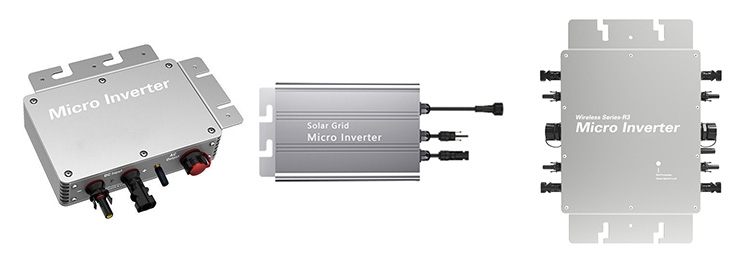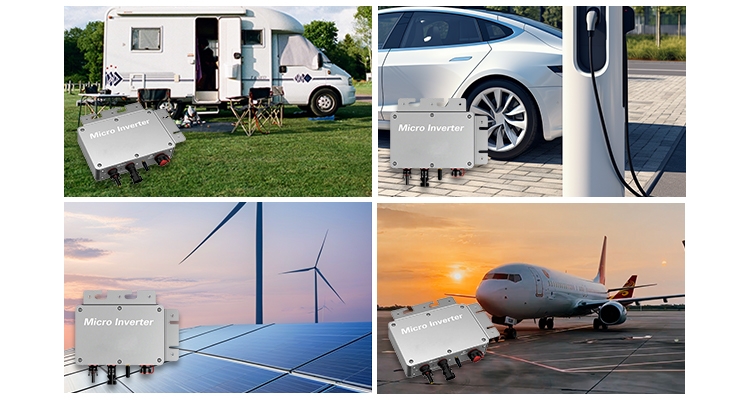In today’s renewable energy landscape, inverters are essential for any solar energy system. With the rapid growth of distributed energy solutions, traditional centralized and string inverters are increasingly unable to meet the demands of diverse applications. In contrast, micro inverters—known for their easy installation, high efficiency, and flexibility—are becoming a popular choice in both residential and commercial solar systems.
The core feature of a micro inverter is its one-to-one connection with each solar panel, enabling individual DC-to-AC conversion and grid integration. This architecture allows for maximum power point tracking (MPPT) on a per-panel basis, delivering better efficiency and performance under variable conditions such as partial shading, non-uniform orientations, or complex rooftop designs. In this article, Inverter.com explores the most common use cases for micro inverters and highlights why they’re gaining traction in the evolving solar energy market.
Why Choose Micro Inverters?
Before diving into specific applications, let’s take a look at the key advantages that set micro inverters apart from traditional solar inverters:
- Independent MPPT for Each Panel: Each panel operates independently, avoiding performance loss due to shading or mismatch, commonly referred to as the "Christmas light effect" in string inverter setups.
- Higher Efficiency and Reliability: Shading, dust, or aging on one panel doesn’t affect the rest of the array.
- Improved Safety: Micro inverters typically operate at lower DC voltages, significantly reducing fire risks—ideal for residential and commercial solar installations.
- Flexible System Design: They adapt easily to various roof angles, orientations, and allow seamless system expansion.
- Simplified Maintenance: Issues can be isolated to individual panels, minimizing repair costs and downtime.
For those researching options in solar power for the home, these benefits make micro inverters an especially attractive solution.

What are the Common Use Cases for Micro Inverters?
1. Portable and Outdoor Applications: RVs, Camping, Field Work
Due to their compact size and lightweight design, micro inverters are well-suited for mobile or temporary power needs such as:
- RV Solar Systems: Powering lights, portable refrigerators, and small appliances during road trips or off-grid camping.
- Remote Monitoring Stations: Ideal for weather stations or wildlife observation setups.
- Field Sampling Equipment: With waterproof and dustproof designs (IP65 or higher), micro inverters can maintain stable operation even in harsh conditions.
These off-grid solar power applications benefit from the durability and modularity of microinverter systems.
2. Residential Rooftop Solar Systems
This is one of the most widespread uses of micro inverters. Traditional string inverters require consistent sunlight and uniform panel angles for optimal performance. In contrast, micro inverters ensure that each solar panel operates at peak efficiency regardless of shading or orientation. Many residential systems integrate smart monitoring platforms that allow homeowners to track each panel’s output via mobile apps, adding convenience and transparency to home solar energy management. If you’re considering solar power for your home, micro inverters offer a safe, efficient, and scalable solution.
3. Small Commercial Buildings
Shops, office buildings, and schools often benefit from the low-maintenance and modular structure of micro inverter systems. Compared to large centralized inverters, micro inverters support localized installations and minimize energy loss due to shading or layout constraints. With increased fire safety and system adaptability, micro inverters are aligned with growing business demands for safe, green energy solutions.
4. Electric Vehicle Charging Systems
As electric vehicle (EV) adoption surges, solar-powered EV charging stations are becoming more common. Micro inverters can be integrated into rooftop solar systems to provide clean solar energy directly to EV chargers, improving the overall energy efficiency. For homeowners, using micro inverters in a solar panel system for EV charging allows for true zero-emission driving during daylight hours.

5. Aerospace and Specialized Fields
In specialized fields like aerospace, telecommunications, and scientific research, compact and high-performance power systems are essential. Micro inverters offer excellent interference resistance and energy reliability, making them ideal for aircraft and drones that require lightweight onboard power systems, and
remote field research equipment where power stability is critical.
6. Uninterruptible Power Supply (UPS) Systems
While traditional UPS systems often use custom inverter modules, micro inverters are now being explored for portable UPS or mobile power station applications. Their quick response time ensures critical systems, like data centers or emergency communications, remain powered during grid outages.
7. Wind Power Systems
Though typically used in solar systems, microinverters can also be applied in small wind turbine setups, such as residential or island-based microgrids. Their modular design and high efficiency make them ideal for unpredictable wind conditions and off-grid scenarios.
8. HVDC Transmission Support Systems
In high-voltage direct current (HVDC) power networks, micro inverters can function as auxiliary conversion units for monitoring and local power adjustments. While main conversion tasks rely on large-scale equipment, micro inverters provide adaptability and control at the system’s edge.
Micro Inverter Product Market Overview
With the rapid expansion of the distributed solar energy market, micro inverters have matured into a highly versatile and well-established product category. Today’s market offers a wide spectrum of options, ranging from 120W portable micro inverters for off-grid or mobile use to 2400W high-capacity models suitable for commercial and industrial solar installations.
Most leading solar micro inverters support independent MPPT for each panel, ensuring maximum efficiency under varying conditions. They also feature remote monitoring capabilities via Wi-Fi or PLC, allowing users to track performance in real time. Their modular design makes system scaling simple, whether for a small residential rooftop or a large commercial project. Additionally, these inverters include robust safety protections, such as overvoltage, overcurrent, and thermal safeguards, and many models are compatible with smart home systems, making them a reliable and future-ready solution for any solar power system.
At Inverter Online Store, we offer a wide range of solar micro inverters from 120W to 2800W, featuring affordable prices and reliable quality. You’ll find a wide selection of micro inverters tailored to both residential and commercial use: 300W–600W models for single-panel setups or small rooftop systems. 1000W+ models for commercial applications with centralized monitoring and large-scale deployment. All models feature IP65 protection, advanced thermal management, and robust build quality.
Conclusion
Micro inverters are no longer just an optional component for rooftop solar—they’re quickly becoming a standard solution in solar energy systems. Whether for home energy use, portable applications, hybrid systems, or remote power needs, micro inverters offer unmatched flexibility, safety, and efficiency.
As solar technology continues to advance and smart energy management becomes mainstream, micro inverters will play an even greater role in the future energy ecosystem.
If you're planning to build a high-efficiency, scalable, and cost-effective solar power system, now is the perfect time to consider switching to micro inverters—you might be surprised by how much more you can get from every panel.
